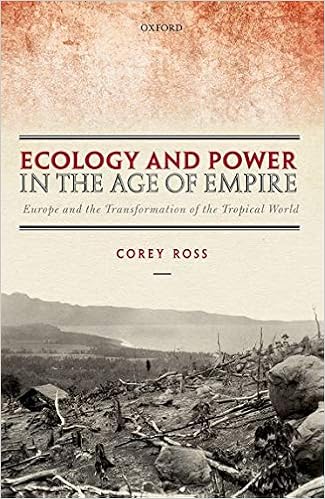Week 7: Environment and Empire
Global environments have been transformed by the rise and fall of colonial empires. In the early modern and modern periods, colonialism and imperialism were not just a matter of military conquest and political rule. Rather, they involved material processes of colonising. These environments shaped empires with political consequences for the state, human and non-human agency, expert knowledge and possibilities for democracy. This session will consider the entangled relationships between environment and empire through a series of episodes and crises. It addresses scholarship on the topic and the socio-technical processes that shaped empires and their legacies, including the rise of the Anthropocene.
Seminar Questions
- How can we think about the role of nature and other non-human actors in shaping the construction of knowledge and expertise about empire?
- To what extent did fossil-fuel based energies shape the rise of modern empire?
- In what ways are political possibilities for democracy and ‘development’ shaped by connections between environment and processes of colonising?
Core Readings
Diana K. Davis, 'Introduction: Imperialism, Orientalism and Environment in the Middle East', in Diana K. Davis and Edmund Burke (eds.), Environmental Imaginaries of the Middle East and North Africa (Athens, OH: Ohio University Press, 2011). LinkLink opens in a new window.
Timothy Mitchell, Carbon Democracy: Political Power in the Age of Oil (Verso, 2011): Introduction (pp.8-16) and Chapter 1 (pp.17-41). LinkLink opens in a new window.
Mike Davis, ‘Chapter 9: The Origins of the Third World’ in Late Victorian Holocausts: El Niño Famines and the Making of the Third World (London and New York: Verso, 2002). LinkLink opens in a new window.
Corey Ross, Ecology and Power in the Age of Empire: Europe and the Transformation of the Tropical World (Oxford: Oxford University Press, 2017), introduction. LinkLink opens in a new window.
Further Reading
Peder Anker, Imperial Ecology: Environmental Order in the British Empire, 1895-1945 (Cambridge MA, 2001).
Alfred W. Crosby, Ecological Imperialism: The Biological Expansion of Europe, 900-1900 (Cambridge, 1986)
Alfred W. Crosby, The Columbian Exchange: Biological and Cultural Consequences of 1492 (Westport and London: Praeger, 2003). LinkLink opens in a new window.
Philip D. Curtin, Death By Migration: Europe's Encounter with the Tropical World in the Nineteenth Century (Cambridge,1989).
Richard H. Grove, Green Imperialism: Colonial Expansion, Tropical Island Edens, and the Origins of Environmentalism, 1660-1860 (New York, 1996).
Richard H. Grove, Ecology, Climate and Empire: Colonialism and Global Environmental History, 1400-1940 (Cambridge, 1997).
William Beinart, and Hughes Lotte, Environment and Empire (New York, 2009).
Felix Driver and Luciana Martins, Tropical Visions in an Age of Empire (Chicago, 2005).
Andreas Malm, Fossil capital: The Rise of Steam Power and the Roots of Global Warming (London, 2016).

